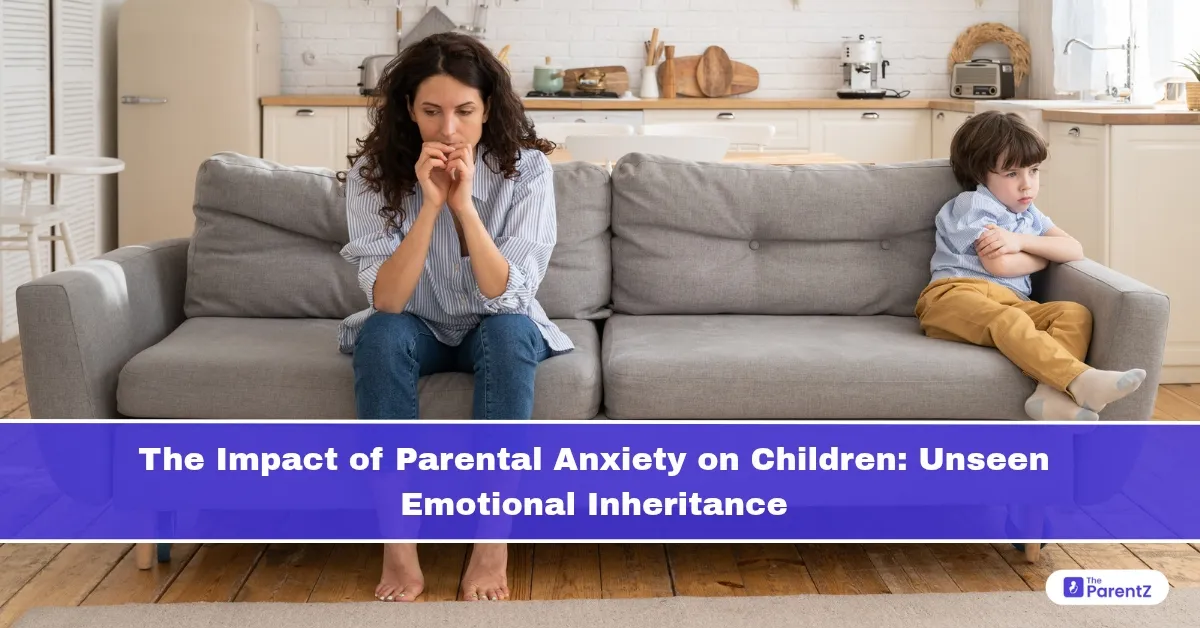Introduction
Anxiety isn’t always loud. Sometimes, it’s hidden behind over-planning, constant checking, or silent worry. As parents, we often carry the weight of responsibility so heavily that we forget—it leaks. Not just into our days, but into our children’s emotional blueprint. Even when we don’t say it out loud, our anxiety speaks. And children, with their intuitive sensitivity, are always listening.
The Emotional Mirror: How Children Absorb Our Inner Worlds
Children are emotional sponges. They may not understand the meaning of a “recession,” “illness,” or “conflict”—but they can feel tension in your voice, the unease in your walk, the way your eyes linger on your phone.
When a parent’s anxiety becomes a pattern—worrying excessively about safety, failure, or the future—children internalize a message: the world is not safe, mistakes are dangerous, or love depends on performance.
This becomes their emotional inheritance—passed down not through DNA, but through daily, subtle interactions.
What Parental Anxiety Might Look Like to a Child
Parental anxiety often translates into behaviors that feel protective, but can be stifling or confusing for a child:
- Micromanaging their homework or social interactions
- Reassuring too often ("Are you okay? Are you sure?")
- Avoiding risk entirely—canceling trips, restricting exploration
- Overreacting to small mistakes ("You left your bottle? What if someone took it?")
While all parents worry, chronic anxious behavior teaches children to fear independence, mistrust their instincts, or believe the world is too fragile to explore.
The Hidden Message: “I Don’t Trust You to Handle This”
When a parent is anxious, especially about their child’s performance or well-being, it often stems from love. But the unintended message is: I don’t believe you can handle discomfort without me.
This belief, repeated over the years, can plant self-doubt in a child. They may become perfectionists, people-pleasers, or risk-avoiders. Or they may internalize your fears as their own, never quite sure why the world feels so heavy.
The Generational Echo of Unspoken Worries
In many families, anxiety is inherited not as diagnosis, but as culture.
A grandparent who lived through scarcity becomes a parent who hoards, who becomes a child who fears lack. A mother who had to be perfect to earn approval becomes a parent who expects the same.
These patterns often feel “normal,” until a child breaks down under the pressure of invisible expectations.
How to Break the Cycle—Without Shame
The goal is not to become an emotionless parent. It’s to become an aware one.
Start by acknowledging your anxiety without self-blame:
- “I tend to worry a lot when things feel uncertain.”
- “I realize I’ve been checking on you too much—I trust you more than I show.”
Bring children into this awareness gently:
- “Sometimes I get scared when I don’t need to. I’m working on it.”
- “I don’t want my worries to become yours.”
That honesty creates emotional safety—a place where both of you can be human, not perfect.
Modeling Calm Over Control
Instead of controlling your child’s environment to manage your anxiety, focus on building their internal resources:
- Let them solve small problems on their own
- Normalize setbacks: “It’s okay to be uncomfortable—feelings aren’t forever”
- Practice mindfulness together: deep breathing, nature walks, journaling
Let them see you cope, not just control. That’s the real inheritance.
When to Seek Support
If anxiety is affecting your parenting—sleepless nights, anger, exhaustion, over-checking—it’s okay to seek help. Therapy, support groups, or even talking to another parent can be healing.
Remember: working on your emotional health is not selfish. It’s an investment in your child’s future.
Conclusion
Parental anxiety isn’t always visible, but its impact runs deep. It doesn’t make you a bad parent—but an unguarded one. The good news? Children don’t need perfect parents. They need present ones. Honest ones. Healing ones.
By becoming aware of your own emotional inheritance, you gain the power to change theirs. And that, perhaps, is the greatest gift you can give.





Be the first one to comment on this story.